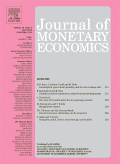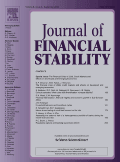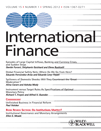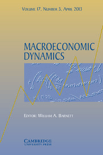
Journal of Central Banking Theory and Practice
Scope & Guideline
Pioneering Discussions on Central Banking Practices
Introduction
Aims and Scopes
- Central Bank Independence and Governance:
Research emphasizing the importance of central bank independence in maintaining economic stability, examining how governance structures affect monetary policy outcomes. - Monetary Policy Effectiveness:
Exploration of the tools and frameworks employed in monetary policy, including quantitative easing, interest rate adjustments, and their impact on economic variables like inflation and income distribution. - Financial Stability and Risk Management:
Analysis of financial stability issues, including the role of central banks in mitigating financial crises, assessing banking sector resilience, and the implications of macroprudential policies. - Emerging Financial Technologies and Central Banking:
Investigation into the impact of fintech, digital currencies, and innovations like blockchain on central banking practices and monetary systems. - Macroeconomic Analysis in Central Banking Contexts:
Application of econometric models and empirical analysis to understand macroeconomic trends, exchange rate dynamics, and their implications for central bank policies. - Regional Focus on Central Banking:
Studies that delve into the specific challenges and policies of central banks in various regions, particularly in emerging and developing economies.
Trending and Emerging
- Impact of Digital Currencies and Fintech:
An increasing number of studies are focusing on the implications of central bank digital currencies (CBDCs) and the influence of fintech on traditional banking practices, signaling a significant shift in the landscape of monetary systems. - Socioeconomic Impacts of Monetary Policy:
Research is increasingly examining how monetary policy decisions affect income distribution, poverty alleviation, and overall socioeconomic stability, highlighting the broader implications of central banking. - Adaptive Policy Frameworks:
There is a growing trend towards developing adaptive monetary policy frameworks that can respond to rapidly changing economic conditions, particularly in the wake of global crises like the COVID-19 pandemic. - Environmental Sustainability in Banking:
Emerging studies focus on the intersection of central banking and environmental sustainability, exploring how central banks can contribute to green finance and address climate-related risks. - Transparency and Communication Strategies:
An increasing emphasis is placed on the transparency of central banks and the effectiveness of their communication strategies, particularly in managing public expectations and market reactions.
Declining or Waning
- Traditional Monetary Policy Frameworks:
There is a noticeable decrease in research centered around conventional monetary policy frameworks, as newer, more complex models and unconventional approaches gain prominence. - Static Economic Models:
The reliance on static economic models for analyzing central banking issues is waning, with a shift towards dynamic and adaptive models that better capture the complexities of modern economies. - Focus on Developed Economies:
A decreasing emphasis on central banking issues in developed countries, as the journal increasingly prioritizes research on emerging markets and their unique challenges. - Simplistic Views on Inflation Dynamics:
Research that simplifies the relationship between monetary policy and inflation dynamics is becoming less common, as scholars seek to explore more intricate and nuanced interactions. - Historical Central Banking Practices:
There is a reduced focus on historical analyses of central banking practices, as contemporary issues and future-oriented research take precedence.
Similar Journals

CESifo Economic Studies
Innovative Perspectives on Economic ChallengesCESifo Economic Studies, published by Oxford University Press, is a distinguished academic journal that focuses on the interdisciplinary exploration of economics and its implications on society. With an ISSN of 1610-241X and an E-ISSN of 1612-7501, the journal aims to disseminate high-quality research that contributes to the advancement of economic knowledge, particularly emphasizing empirical findings and innovative theoretical frameworks. As a recognized leader in its field, CESifo Economic Studies holds a 2023 Q2 ranking in both Economics and Econometrics and Geography, Planning and Development, reflecting its significant impact and relevance in these areas. The journal is accessible through traditional subscription models, ensuring that critical economic research remains available to scholars, policymakers, and educators alike. With a commitment to excellence in publication, the journal supports the academic community through the provision of rigorous peer-reviewed articles that address current challenges and trends in economics. Researchers and students seeking to deepen their understanding of economic mechanisms will find this journal an invaluable resource.

JOURNAL OF FINANCIAL SERVICES RESEARCH
Advancing knowledge in financial services research.The JOURNAL OF FINANCIAL SERVICES RESEARCH, published by SPRINGER, serves as a critical platform for scholarly discourse in the fields of finance, accounting, and econometrics. With a dedicated focus on innovative research and rigorous analysis, this journal has maintained a respectable Impact Factor, placing it in the Q2 category for 2023 across multiple academic disciplines including Accounting, Economics, and Finance. Since its inception in 1987, it has contributed significantly to the advancement of knowledge and practice within financial services, making it essential reading for researchers, professionals, and students alike. The journal is based in the Netherlands and hosts contributions that address contemporary issues in financial systems, markets, and institutions. Despite its non-open access format, the journal remains highly relevant, with Scopus rankings indicating its solid position within its peer group, especially in the realms of Economics, Econometrics, and Finance. As the journal approaches its converged coverage through 2024, it aims not only to disseminate high-quality research but also to foster a deeper understanding of the dynamic financial landscape.

FEDERAL RESERVE BANK OF ST LOUIS REVIEW
Connecting theory with practice in the world of finance.The Federal Reserve Bank of St. Louis Review is a prestigious academic journal published by the Federal Reserve Bank of St. Louis, dedicated to disseminating high-quality research in the field of economics and finance. As a respected publication, it holds a significant position in its domain, as evidenced by its placement in the Q2 quartile in the Business and International Management category and ranking 210 out of 443 in Scopus. The journal offers an insightful platform for researchers, professionals, and students alike to engage with cutting-edge analyses and discussions, emphasizing topics relevant to monetary policy, economic trends, and financial stability. Although it operates without an Open Access model, its articles are instrumental for those looking to deepen their understanding of economic dynamics and policy implications in today’s global marketplace. With a commitment to fostering scholarly exchange, the Federal Reserve Bank of St. Louis Review remains a vital resource for advancing knowledge and practical solutions in economics and finance.

Journal of Risk Finance
Connecting theory and practice in risk finance.The Journal of Risk Finance, published by Emerald Group Publishing Ltd, is a premier academic journal dedicated to advancing the understanding of risk management and finance practices since its inception in 1999. With a strong foothold within the Q2 rankings in both Accounting and Finance categories, it proudly holds a significant place in the scholarly landscape, ranking #54 out of 317 in the Scopus Economics and Finance category, placing it in the 83rd percentile. The journal aims to facilitate the exchange of innovative research and practical insights, catering to an audience of researchers, professionals, and students eager to explore contemporary issues in risk finance. While not an open access journal, it provides numerous access options, ensuring that essential findings reach a broad readership. Set in the United Kingdom and covering publications up to 2024, the Journal of Risk Finance continues to be an indispensable resource for those committed to this critical field.

JOURNAL OF MONETARY ECONOMICS
Bridging Theory and Practice in Monetary EconomicsJOURNAL OF MONETARY ECONOMICS, published by Elsevier, stands as a premier platform for scholars and practitioners in the field of monetary economics. With a robust ISSN of 0304-3932 and E-ISSN 1873-1295, this esteemed journal has maintained a significant influence since its inception in 1975, continuing its legacy of rigorous scholarship through to 2024. The journal is recognized for its high impact in the field, boasting a Q1 category in both Economics and Econometrics and Finance as per the 2023 rankings. Its Scopus rankings underscore its prominence, with a top percentile standing in critical categories—a testament to its critical role in advancing research and discourse. While not an open-access publication, it offers invaluable insights for those dedicated to understanding complex fiscal dynamics and economic policies. The Journal of Monetary Economics serves as an essential resource for researchers, professionals, and students eager to explore the intricacies of financial systems and economic theory.

Annals of Economics and Finance
Exploring the Intersection of Economics and Finance.Annals of Economics and Finance is an esteemed academic journal published by Wuhan University Journals Press, focusing on the fields of Economics and Finance. Established in 2000, this journal serves as a platform for scholars to disseminate their research findings and insights, contributing to the development of these disciplines through rigorous peer-reviewed articles. Despite currently holding a Q4 ranking in both Economics and Econometrics and Finance categories (2023), it strives to enhance its impact on the academic community and policy-making audiences. While not Open Access, the journal seeks to cultivate a deeper understanding of vital economic theories and financial practices, thereby offering invaluable resources for researchers, professionals, and students alike. With its broad scope, the Annals of Economics and Finance is poised to play a crucial role in shaping contemporary economic discourse up to 2024 and beyond.

Journal of Financial Stability
Fostering dialogue on the dynamics of financial stability.The Journal of Financial Stability, published by Elsevier Science Inc., is a renowned academic journal that serves as a premier platform for the dissemination of innovative research in the fields of finance, economics, and econometrics. With an ISSN of 1572-3089 and an E-ISSN of 1878-0962, this journal has established itself as a leader in its category, ranking Q1 for both Economics and Finance in the 2023 category quartiles. This positions it amongst the top 13% of journals in Economics and the top 35% in Finance, according to Scopus rankings. Covering a wide range of topics related to financial stability, the journal aims to fulfill its objective of advancing scholarly communication and providing researchers, professionals, and students with valuable insights into contemporary financial challenges and innovations. Operating from the Netherlands and converging from 2004 to 2024, the Journal of Financial Stability continues to contribute significantly to the academic landscape, inviting submissions that push the boundaries of knowledge and understanding in financial systems.

International Finance
Transforming theories into impactful financial practices.International Finance is a prestigious academic journal published by WILEY, dedicated to the exploration and advancement of theories and practices in the realms of finance, development, and geography. With a strong emphasis on empirical and theoretical research, this journal provides a crucial platform for researchers, professionals, and students to disseminate cutting-edge findings that shape our understanding of the financial landscape on a global scale. Holding an impressive impact factor and categorized in the Q2 quartile across multiple disciplines, including Development, Finance, and Geography, the journal has established itself as a significant contributor to scholarly discourse. Since its inception in 1998 and spanning until 2024, International Finance offers a comprehensive overview of current trends and challenges faced in financial contexts, enhancing the decision-making processes within academia and industry alike. Although the journal is not open access, its rigorous peer-review process guarantees high-quality content that is indispensable for anyone engaged in the diverse fields intersecting with finance.

Journal of Banking and Finance Law and Practice
Fostering Innovation in Banking and Finance LawJournal of Banking and Finance Law and Practice is a premier academic journal published by LAWBOOK CO LTD, focusing on the dynamic intersection of banking, finance, law, and regulatory practices. With an ISSN of 1034-3040, this journal serves as a vital resource for researchers, legal practitioners, and students seeking to enhance their understanding of the evolving legal frameworks governing financial institutions and practices. While the journal is not open access, it provides a wealth of peer-reviewed articles, case studies, and insightful commentary that contribute significantly to the discourse in financial law. The articles featured in this journal aim to address contemporary issues and challenges within the banking and finance sectors, promoting critical analysis and innovative solutions in the legal sphere. As a result, Journal of Banking and Finance Law and Practice holds an important place in scholarly communication, fostering knowledge exchange while shaping future legal practices in finance.

MACROECONOMIC DYNAMICS
Unraveling Macroeconomic Theories and PracticesMACROECONOMIC DYNAMICS, a distinguished academic journal published by Cambridge University Press, serves as a pivotal platform for innovative research in the fields of economics and econometrics. With its ISSN 1365-1005 and E-ISSN 1469-8056, the journal has been at the forefront of scholarly communication since its inception in 1997, offering an extensive range of articles that explore dynamic economic models, policy impacts, and theoretical advancements through the latest empirical analyses. Currently holding a Q2 ranking within the 2023 Economics and Econometrics category, and positioned at rank #409 out of 716 within Scopus, it is an essential resource for researchers, professionals, and students alike, looking to stay updated on critical developments in macroeconomic theory and practice. Although it follows a traditional subscription model rather than Open Access, the journal continually strives to disseminate high-quality, peer-reviewed content that informs and inspires the global economics community. The importance of MACROECONOMIC DYNAMICS lies in its commitment to fostering a deeper understanding of economic phenomena, making it a must-read for anyone engaged in the complexities of the economic landscape.